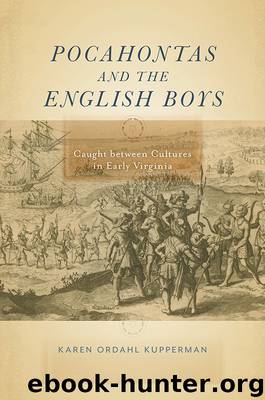Pocahontas and the English Boys: Caught Between Cultures in Early Virginia by Karen Ordahl Kupperman

Author:Karen Ordahl Kupperman
Language: eng
Format: epub
Tags: United States, Colonial Period (1600-1775), HIS000000 History / General, Native American, History
Publisher: NYU Press
Published: 2019-03-12T00:00:00+00:00
Lottery poster, Society of Antiquaries, London.
So, in 1616, the Virginia Company again revamped its plan. The previous lotteries had been in London and were called “standing lotteries,” but now company officials created what they called a “running lottery.” Company agents went to cities and towns all over England and proposed holding a lottery in them. The town would benefit, and part of the proceeds would go to charity. Delays in announcing winners had discouraged prospective ticket holders, but the running lotteries offered instant results and real rewards. The running lotteries created a festive atmosphere, and they brought Virginia to popular attention all over the country. They also brought in money.37
Meanwhile, Sir Walter Ralegh was soliciting funding for a venture to Guiana on the Caribbean coast of South America. He had been freed from a very long imprisonment in the Tower of London in March of that year in order to carry out his plan. Ralegh had been the backer (and owner) of the ill-fated Roanoke colonies in the mid-1580s. Although he never went to Roanoke, he did lead an expedition to Guiana in 1595, and he returned convinced that the fabled golden city of El Dorado was there, as he argued in The Discovery of the Large, Rich, and Beautiful Empire of Guiana, with a Relation of the Great and Golden City of Manoa (Which the Spaniards Call El Dorado) (1596).
When James I came to the throne after Queen Elizabeth’s death in 1603, he believed that Ralegh had conspired to block him from becoming king, and he committed Sir Walter to prison on a suspended sentence of death. From 1603 on, Ralegh campaigned to be allowed to return to Guiana in search of the wealth he was certain was there, and his appeal was finally effective in 1616. His permit stipulated that there would be no violent clashes with the Spanish. King James was not going to rekindle the war with Spain from Queen Elizabeth’s time through some hotheaded actions over there.
During 1616 and the first part of 1617, Guiana and Virginia dueled for a place in the public imagination. Ralegh gathered £30,000, a sum close to what the Virginia Company had raised over the previous decade, and his expedition set sail in June 1617. His ship was aptly named Destiny.38
Ralegh had left two English boys in Guiana in 1595, but neither was present in 1617. Ralegh had promised to return in 1596, but as often happened with this kind of plan, events in England prevented it. Francis Sparrey had been captured by the Spanish and taken into prison in Madrid, where he became Francisco Espari. Hugh Goodwin had been killed by tigers, according to Spanish reports.39 Thomas Savage and Henry Spelman would have been abandoned in the same way if Lord de la Warr had not arrived in the nick of time when the Jamestown colonists gave up and headed for home in 1610.
Ralegh’s new expedition did not find the hoped-for gold, and some of the men attacked a Spanish fort while they were in Guiana, violating the king’s instructions.
Download
This site does not store any files on its server. We only index and link to content provided by other sites. Please contact the content providers to delete copyright contents if any and email us, we'll remove relevant links or contents immediately.
Man-made Catastrophes and Risk Information Concealment by Dmitry Chernov & Didier Sornette(4802)
The Revenge of Geography: What the Map Tells Us About Coming Conflicts and the Battle Against Fate by Kaplan Robert D(3623)
Zero Waste Home by Bea Johnson(3319)
COSMOS by Carl Sagan(2980)
In a Sunburned Country by Bill Bryson(2978)
Good by S. Walden(2940)
The Fate of Rome: Climate, Disease, and the End of an Empire (The Princeton History of the Ancient World) by Kyle Harper(2464)
Camino Island by John Grisham(2417)
A Wilder Time by William E. Glassley(2383)
Organic Mushroom Farming and Mycoremediation by Tradd Cotter(2324)
Human Dynamics Research in Smart and Connected Communities by Shih-Lung Shaw & Daniel Sui(2196)
The Ogre by Doug Scott(2145)
Energy Myths and Realities by Vaclav Smil(2085)
The Traveler's Gift by Andy Andrews(2036)
Inside the Middle East by Avi Melamed(1958)
Birds of New Guinea by Pratt Thane K.; Beehler Bruce M.; Anderton John C(1930)
Ultimate Navigation Manual by Lyle Brotherton(1786)
A History of Warfare by John Keegan(1743)
And the Band Played On by Randy Shilts(1647)
